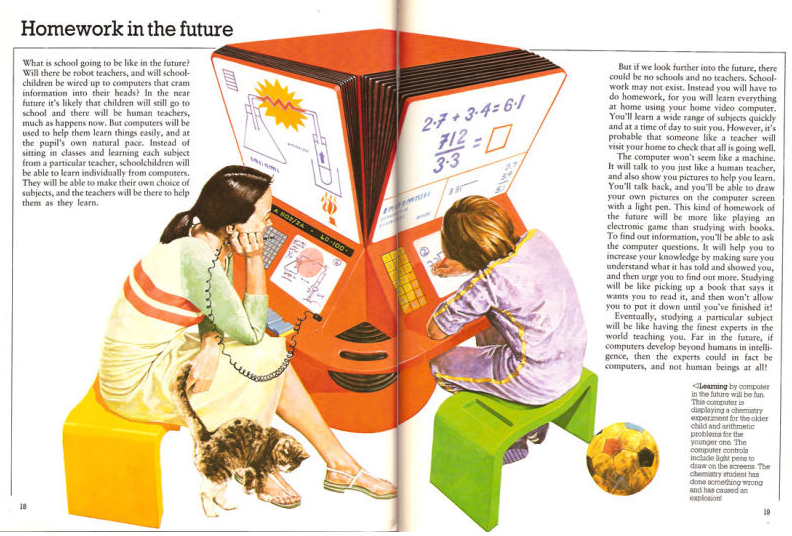21/12/2016
6 predictions for digital learning in 2017
It’s always difficult making predictions for the future – none more so than in technology and education. Just take a look at this article, every generation has its shiny new technology that will change education forever: 15 Technologies that were supposed to change education. Our particular favourite is number 13 – the Homework Machine from 1981!
Undaunted, we are going to make some predictions about what will have an impact on digital learning next year … or maybe the year after … or the year after that (you get the picture).
- Artifical Intelligence (AI) – such a broad area, AI has been around for a while and basically refers to anything where intelligence is exhibited by a machine. In real terms, AI can mean anything whereby a computer is displaying cognitive functions that we would normally associate with the human mind – driverless cars are a great example. In learning, the applications of AI are enormous, potentially covering everything from the grading of homework through to virtual tutors (a few of the examples that follow also incorporate some form of AI or machine learning);
- General Data Protection Regulation (GDPR) – many of the new innovations in digital learning require access to student data – and lots of it. This raises all sorts of issues around data privacy and data protection. The GDPR is a new EU Regulation that will enter into force in Ireland in May 2018 and provides a whole new set of rights for data subjects (e.g. learners), much more than our existing data protection legislation. Expect lots of activity in 2017!
- Personalisation – whilst personalisation technology is commonplace in retail and consumer markets, the holy grail of “personalised learning” has proven to be very difficult to achieve in practice. However, with access to more data points, larger and richer data sets and embracing the potential of machine learning, could 2017 finally be the year that personalized learning delivers on its promise?
- Speech Technology – think about it: our voices are our most natural user interface, yet personal voice computing is only just starting to go mainstream in consumer markets (for example, Amazon Echo and Alexa, Google Home). The applications in education are enormous – enabling us to incorporate the expressive voice as a form of interaction with mobile devices. From assessment of phonological awareness, through to command-control voice interaction with educational games.
- Augmented and Virtual Reality (AR/VR) – whilst very different technologies, what both AR and VR bring to the learning sphere are much more experiential and engaging educational opportunities. Now at more affordable levels, both AR and VR could be set to go mainstream in education in 2017;
- More agile, evidence-based research – after so many false dawns, 2017 might just be the year that we see more evidence-based research on the efficacy of using technology to support learning. This time last year, the OECD found that “school systems need to find more effective ways to integrate technology into teaching and learning”. To do so, we need more agile and responsive research with actionable insights.
Let’s see if we are right …

